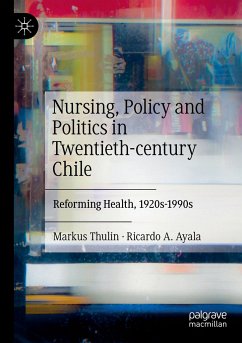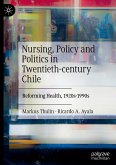This book offers the first in-depth account of healthcare policy in Chile across the twentieth century. It charts how nursing and nurses intersected with the political context of healthcare, with a focus on the country's transition across welfare systems. Drawing on extensive archival research and interviews with nurses and governmental representatives, this book explores how the nursing profession implemented and challenged reform, while policies had an impact on nurses. It analyses nurses' employment and mobility, and their lobbying through the press and through unions. The authors demonstrate that while Chilean health policy was influenced by US cultural politics, reform depended on the flexibility and willingness of nurses to carry through reforms. By examining the participation of the largest female professional group, the book offers new insights into the privatization of society on the pinnacle of industrial development and seeks to contribute to contemporary debates onChile's welfare system. It is a vital read for scholars researching the history of public health.
Bitte wählen Sie Ihr Anliegen aus.
Rechnungen
Retourenschein anfordern
Bestellstatus
Storno








